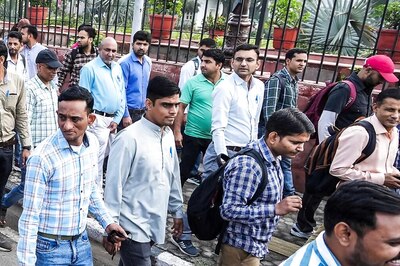
views
Indian information technology firms are looking for increased spending on education, e-governance and defence sectors, and an extension by at least one year of tax benefits under the Software Technology Parks of India (STPI) scheme, but many think it is unlikely.
STPI was a society set up by the Ministry of Information Technology in 1991 to boost software exports. Among other benefits, the STPI scheme provides a 10-year income tax exemption for units situated in software technology parks.
"I think extension of STPI is a bleak possibility in the current form," said Ganesh Murthy, chief financial officer at MphasiS.
In the 2009-10 budget, the government had extended tax benefits for units in STPI by a year to March 2011, in the backdrop of a financial crisis in the United States, which accounts for more than 50 per cent of India's software exports.
The budget for 2010-11 went without any mention of extending the STPI scheme, disappointing IT companies.
"We believe, an extension will not come," Anand Rathi Securities analyst Naushil Shah said, adding most analysts have factored in higher tax rates for the next fiscal. "So, if STPI is not extended, it will be neutral for the sector and if it gets extended, it will be a positive surprise."
Small- and mid-cap IT firms are hoping for an extension of the STPI scheme, as many have still not migrated to special economic zones to continue enjoying some sort of tax benefits.
"We urge the government to extend the tax benefits under the STPI scheme for another year or two to empower growth of small and medium sized companies," Surjeet Singh, chief financial officer at Patni Computer Systems, said.
SEZs, often located in and around large cities, also pose capacity constraints, while high rentals pose a cost barrier for small companies.
If the STPI scheme is not extended, the increase in tax rate further could crimp margins, which are already under pressure due to attrition, rupee's appreciation and lower pricing.
"Most of the companies are paying an effective tax rate of about 15% and straight away that will jump to 25 per cent," Murthy said. "Obviously the margins will take a hit."
IT companies greeted last year's budget with a muted response as the government, while remaining silent on STPI, also raised the minimum alternate tax to 18 per cent of book profits from 15 per cent, impacting cash flows.
The industry is looking forward to the minimum alternate tax rate being rolled back to 15 per cent, Patni's Surjeet Singh said.
However, analyst Shah expects the government to maintain status quo.
The $60 billion IT services sector is also expecting the 2011-12 budget to bring increased funding to the e-governance, defence and education sectors, increasing opportunities in the domestic market for IT companies.
Increase in defence spending will benefit companies such as Rolta India and Infotech Enterprises, while a rise in the education outlay would give a boost to firms such as Aptech, NIIT and Everonn Education.
The industry is also expecting the budget to address the refund of service tax on inputs used for export of software and simplify the process.




















Comments
0 comment